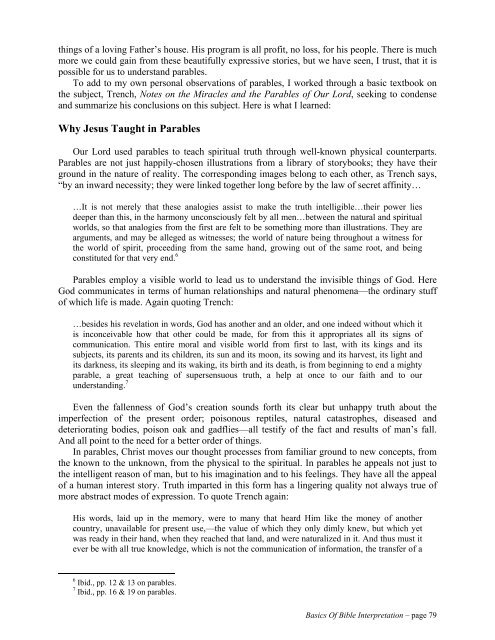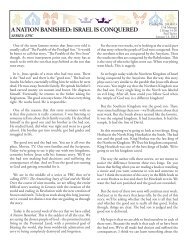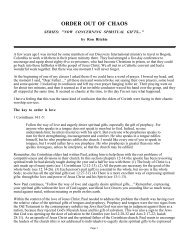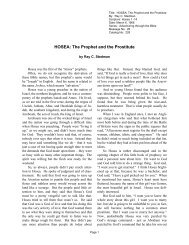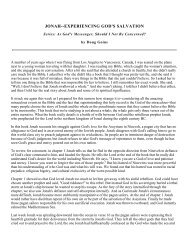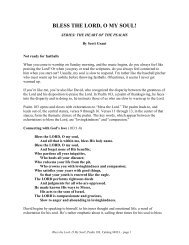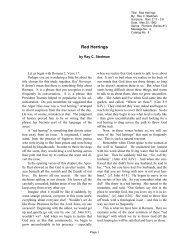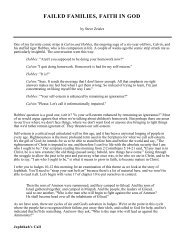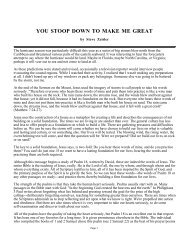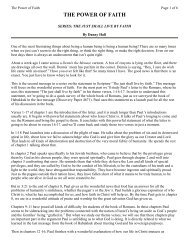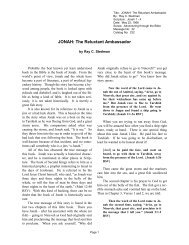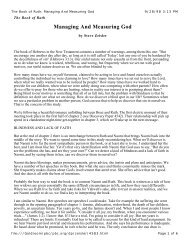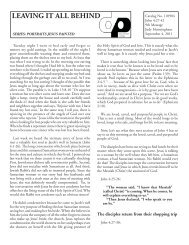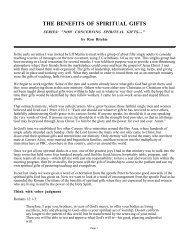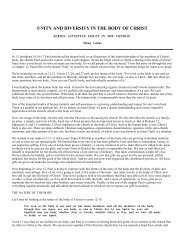Basics of Bible Interpretation - RayStedman.org
Basics of Bible Interpretation - RayStedman.org
Basics of Bible Interpretation - RayStedman.org
You also want an ePaper? Increase the reach of your titles
YUMPU automatically turns print PDFs into web optimized ePapers that Google loves.
things <strong>of</strong> a loving Father’s house. His program is all pr<strong>of</strong>it, no loss, for his people. There is much<br />
more we could gain from these beautifully expressive stories, but we have seen, I trust, that it is<br />
possible for us to understand parables.<br />
To add to my own personal observations <strong>of</strong> parables, I worked through a basic textbook on<br />
the subject, Trench, Notes on the Miracles and the Parables <strong>of</strong> Our Lord, seeking to condense<br />
and summarize his conclusions on this subject. Here is what I learned:<br />
Why Jesus Taught in Parables<br />
Our Lord used parables to teach spiritual truth through well-known physical counterparts.<br />
Parables are not just happily-chosen illustrations from a library <strong>of</strong> storybooks; they have their<br />
ground in the nature <strong>of</strong> reality. The corresponding images belong to each other, as Trench says,<br />
“by an inward necessity; they were linked together long before by the law <strong>of</strong> secret affinity…<br />
…It is not merely that these analogies assist to make the truth intelligible…their power lies<br />
deeper than this, in the harmony unconsciously felt by all men…between the natural and spiritual<br />
worlds, so that analogies from the first are felt to be something more than illustrations. They are<br />
arguments, and may be alleged as witnesses; the world <strong>of</strong> nature being throughout a witness for<br />
the world <strong>of</strong> spirit, proceeding from the same hand, growing out <strong>of</strong> the same root, and being<br />
constituted for that very end. 6<br />
Parables employ a visible world to lead us to understand the invisible things <strong>of</strong> God. Here<br />
God communicates in terms <strong>of</strong> human relationships and natural phenomena—the ordinary stuff<br />
<strong>of</strong> which life is made. Again quoting Trench:<br />
…besides his revelation in words, God has another and an older, and one indeed without which it<br />
is inconceivable how that other could be made, for from this it appropriates all its signs <strong>of</strong><br />
communication. This entire moral and visible world from first to last, with its kings and its<br />
subjects, its parents and its children, its sun and its moon, its sowing and its harvest, its light and<br />
its darkness, its sleeping and its waking, its birth and its death, is from beginning to end a mighty<br />
parable, a great teaching <strong>of</strong> supersensuous truth, a help at once to our faith and to our<br />
understanding. 7<br />
Even the fallenness <strong>of</strong> God’s creation sounds forth its clear but unhappy truth about the<br />
imperfection <strong>of</strong> the present order; poisonous reptiles, natural catastrophes, diseased and<br />
deteriorating bodies, poison oak and gadflies—all testify <strong>of</strong> the fact and results <strong>of</strong> man’s fall.<br />
And all point to the need for a better order <strong>of</strong> things.<br />
In parables, Christ moves our thought processes from familiar ground to new concepts, from<br />
the known to the unknown, from the physical to the spiritual. In parables he appeals not just to<br />
the intelligent reason <strong>of</strong> man, but to his imagination and to his feelings. They have all the appeal<br />
<strong>of</strong> a human interest story. Truth imparted in this form has a lingering quality not always true <strong>of</strong><br />
more abstract modes <strong>of</strong> expression. To quote Trench again:<br />
His words, laid up in the memory, were to many that heard Him like the money <strong>of</strong> another<br />
country, unavailable for present use,—the value <strong>of</strong> which they only dimly knew, but which yet<br />
was ready in their hand, when they reached that land, and were naturalized in it. And thus must it<br />
ever be with all true knowledge, which is not the communication <strong>of</strong> information, the transfer <strong>of</strong> a<br />
6 Ibid., pp. 12 & 13 on parables.<br />
7 Ibid., pp. 16 & 19 on parables.<br />
<strong>Basics</strong> Of <strong>Bible</strong> <strong>Interpretation</strong> – page 79


